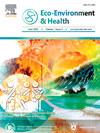温度介导的海洋塑料生物降解研究综述
IF 17.6
引用次数: 0
摘要
生物降解为解决海洋塑料污染提供了一个很有前途的解决方案。温度在生物膜发育和微生物动力学中起着重要的作用。然而,关于温度对海洋塑料生物降解影响的综合研究仍然有限,因为大多数研究都集中在个体和中等温度上,忽视了极地到热带海洋环境的温度变化如何与其他生态因素相互作用,影响塑料的生物降解。本文综述了塑料在温度诱导生物膜形成、微生物演代和酶解聚方面的研究进展。研究结果表明,较高的温度通常会促进生物膜的生长。值得注意的是,耐寒细菌刺激细胞外聚合物质(EPS)的产生,以稳定生物膜并适应寒冷条件。微生物演替,特别是变形菌门内的微生物演替,主要受温度调节,驱动微生物多样性和活动的变化。对于不同类型的塑料,可水解的塑料主要在温和的温度下通过诸如角质酶、脂肪酶和解聚合酶等酶进行降解。相比之下,不可水解塑料相对不易被酶分解,但可以被酶产生的活性氧(ROS)生物降解,由于其生物降解缓慢,温度影响最小。这篇综述强调了温度在生物降解过程中的关键作用,并展望了在气候变化下改善海洋塑料管理的有希望的策略。本文章由计算机程序翻译,如有差异,请以英文原文为准。

A critical review on temperature-mediated marine plastic biodegradation
Biodegradation offers a promising solution to marine plastic pollution. Temperature plays a significant role in biofilm development and microbial dynamics. However, comprehensive studies on the effects of temperature on marine plastic biodegradation remain limited, as most research focuses on individual and moderate temperatures, overlooking how temperature variations across polar to tropical marine environments interact with other ecological factors to influence plastic biodegradation. This review summarizes current research on temperature-induced biofilm formation, microbial succession, and enzymatic depolymerization of plastics. The findings reveal that higher temperatures generally enhance biofilm growth. Notably, cold-tolerant bacteria stimulate the production of extracellular polymeric substances (EPS) to stabilize biofilms and adapt to cold conditions. Microbial succession, particularly within the Proteobacteria phylum, is primarily regulated by temperature, driving shifts in microbial diversity and activity. For different types of plastics, the hydrolyzable ones are degraded via enzymes such as cutinases, lipases, and depolymerases, mostly at mild temperatures. In contrast, non-hydrolyzable plastics are relatively recalcitrant to enzymatic breakdown but can be biodeteriorated by enzyme-generated reactive oxygen species (ROS), with minimal temperature influence due to their slow biodegradation. This review emphasizes the critical role of temperature in biodegradation processes and prospects for promising strategies for improving marine plastic management under the changing climate.
求助全文
通过发布文献求助,成功后即可免费获取论文全文。
去求助
来源期刊

Eco-Environment & Health
环境科学与生态学-生态、环境与健康
CiteScore
11.00
自引率
0.00%
发文量
18
审稿时长
22 days
期刊介绍:
Eco-Environment & Health (EEH) is an international and multidisciplinary peer-reviewed journal designed for publications on the frontiers of the ecology, environment and health as well as their related disciplines. EEH focuses on the concept of “One Health” to promote green and sustainable development, dealing with the interactions among ecology, environment and health, and the underlying mechanisms and interventions. Our mission is to be one of the most important flagship journals in the field of environmental health.
Scopes
EEH covers a variety of research areas, including but not limited to ecology and biodiversity conservation, environmental behaviors and bioprocesses of emerging contaminants, human exposure and health effects, and evaluation, management and regulation of environmental risks. The key topics of EEH include:
1) Ecology and Biodiversity Conservation
Biodiversity
Ecological restoration
Ecological safety
Protected area
2) Environmental and Biological Fate of Emerging Contaminants
Environmental behaviors
Environmental processes
Environmental microbiology
3) Human Exposure and Health Effects
Environmental toxicology
Environmental epidemiology
Environmental health risk
Food safety
4) Evaluation, Management and Regulation of Environmental Risks
Chemical safety
Environmental policy
Health policy
Health economics
Environmental remediation
 求助内容:
求助内容: 应助结果提醒方式:
应助结果提醒方式:


